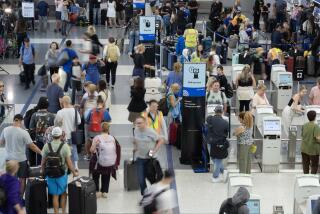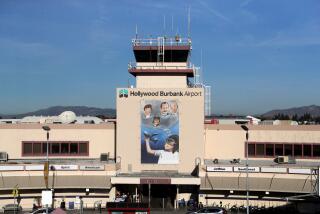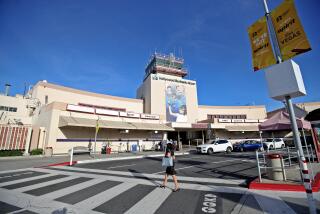Air Courier Flies in Face of Curfew Controversy at Burbank Airport
- Share via
Even before the plane’s wheels hit the runway, when it is still no more than a cluster of lights in the late-night sky, Ameriflight’s John Hazlet has identified the small, 15-passenger aircraft as one of his. He can tell from the distant sounds of its engine.
To Hazlet, director of operations and vice president of maintenance, airplanes are a lifelong love as well as a profession, and engine noise is something to approach diagnostically. But he knows that to most residents around Burbank Airport, noise is noise, particularly in the middle of the night.
Some wish the company would just leave. If Burbank Airport officials succeed in obtaining an across-the-board mandatory nighttime curfew, the shipping company might be forced to relocate, officials say. Airport officials also are considering building a new terminal on the site now occupied by Ameriflight’s hangar and nine others.
Both airline projects--the mandatory curfew and the new terminal building--are expected to take years to complete. In the meantime, Ameriflight is keeping its fleet in the sky.
With $86 million in gross annual revenue, Ameriflight, a division of ATI Systems International, is one of the nation’s largest small-airplane courier companies. It carries millions of dollars in bank notes and packages for UPS, Federal Express and other shipping and courier companies that need the service to meet their overnight deadlines.
Altogether these operators ship about $1 billion to $3 billion in bank notes out of Burbank Airport every night, with Ameriflight handling $600 million to $700 million, company officials said. Because of strict time constraints and overcrowded conditions at other regional airports, that commerce would be jeopardized if a curfew prohibited nighttime operations at Burbank, officials said.
Also, if Ameriflight moved from its Burbank headquarters, the airport would lose nearly $400,000 in annual revenue, said airport spokesman Victor Gill.
Ameriflight’s operation accounts for more than half of the total night activity there, Gill said. At 3 a.m., long after the commercial airliners have been put to bed, Ameriflight’s small planes are in full swing--and upsetting neighbors.
After years of wrangling with homeowners and businesses over noise, Burbank Airport has started the lengthy process of formally adopting a mandatory ban on all nighttime airplane activity. If the ban is approved by the Federal Aviation Administration, all aircraft would be prohibited from operating between 10 p.m. and 7 a.m., except in emergencies. The curfew would cover the busiest time for Ameriflight’s planes.
“Put out of business might be too strong,” Hazlet said, “but it would have a profound effect on what we can do to serve our customers out of this airport.”
At least one or two Ameriflight planes run every hour of the curfew on weeknights. That comes to about 25 round trips, with busy periods starting at 10 p.m., 2 a.m. and 5 a.m.
Burbank Airport has a voluntary curfew that applies only to large commercial jets, not small executive planes or the propeller-driven aircraft used by Ameriflight. Nor are the company’s planes limited by the few mandatory restrictions on flying procedures and older, smaller aircraft.
Because the curfew on large commercial jets is voluntary, the large carriers frequently land after the 10 p.m. deadline. There are two regularly scheduled flights before 7 a.m. and three at 10 p.m. or later, said Victor Globa, an airport official. Airline companies that violate the voluntary curfew face no action other than a reminder letter from the airport. Under the proposed mandatory curfew, violators would face fines and possible termination of their leases after repeated violations.
Airport officials hope that by imposing a mandatory curfew, they would gain local support for their proposal to build a new terminal. They want to relocate the existing airport terminal--which is too close to the east-west runway to meet current safety standards--to a 130-acre parcel previously owned by Lockheed Martin.
But after prolonged difficulties in acquiring the Lockheed site, the airport requested in February that an environmental study be conducted for an alternative location--the southwest corner of the airport where Ameriflight has its hangar.
Some residents and politicians oppose the idea of a new terminal in either spot, saying it would attract more people and airplanes and generate more noise.
“We are developing a huge, regional airport in what is really a bedroom community,” said Christopher Barnes of the Studio City Residents Assn. His group and others have spent years pushing the idea of the curfew.
“The mandatory nighttime curfew is one of the main things that will control the quality of life, not only for Burbank but also for surrounding communities,” said Stan Hyman, a Burbank resident and board member of the Toluca Lake Homeowners Assn.
Aware of its delicate predicament, Ameriflight’s fleet meets the most recent and stringent noise standard set by the FAA, Gill said. The company tries to vary its flight paths at night to avoid disturbing any one residential area, and it is developing a system to reduce airplane propeller noise, Hazlet said.
While some praise the efforts, others remain dissatisfied. Studio City resident Stephanie Erb said she had to move from a corner bedroom to an interior bedroom in her home because of the airplane noise. She also installed a double-paned window in the room and began using a white-noise machine to drown out the sound.
Mary Bollero of North Hollywood said she is disturbed by night flights at least once a week. Although she appreciates Burbank Airport during business hours, Bollero said 11 p.m. to 7 a.m. should be off-limits, except for medical emergencies.
“You feel the house shaking, like a small earthquake, your head starts pounding really fast and you hear this large grinding sound overhead, like a lawn mower,” Bollero said. “Then you hear it going off into the distance and you lay awake there, trying to go back to sleep. It’s very disturbing.”
Although residents have repeatedly asked Ameriflight to move its facility to Palmdale or another more remote airport, company officials said straying too far from Los Angeles would upset its schedule.
“Business and commerce in Southern California dictate that these items get moved at these times,” Ameriflight President Gary Richards said. “If we didn’t do it, someone else would.”
More to Read
Inside the business of entertainment
The Wide Shot brings you news, analysis and insights on everything from streaming wars to production — and what it all means for the future.
You may occasionally receive promotional content from the Los Angeles Times.










